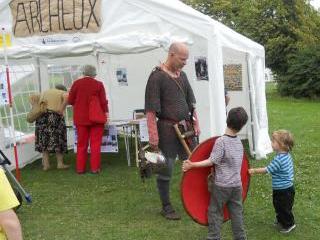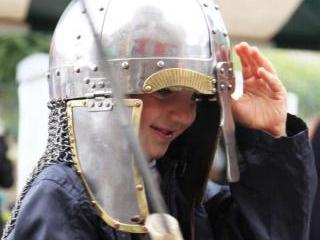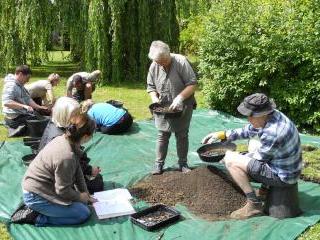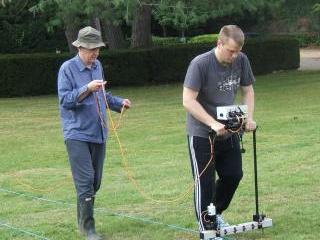July 2011
East Oxford Archaeology Project: Newsletter July 2011
 Another busy and very interesting two months for the Project. One of the highlights was the Volunteers Meeting at the Ark-T where several of you presented your research work to a very-well attended meeting. There was a real buzz and we know that various groups and individuals are now linking up to share research and ideas. Many of us will be away during August so things will be a little quieter before activities pick up again in the Autumn. But watch out for emails as events are planned.
Another busy and very interesting two months for the Project. One of the highlights was the Volunteers Meeting at the Ark-T where several of you presented your research work to a very-well attended meeting. There was a real buzz and we know that various groups and individuals are now linking up to share research and ideas. Many of us will be away during August so things will be a little quieter before activities pick up again in the Autumn. But watch out for emails as events are planned.
The new website is live! If you have not already had a look please do and let Paula know if you have any suggestions or comments. Test pit reports are now being added so please check back regularly. A recent addition to the Factsheets is one on finds processing. This can be found under Factsheets – Post Excavation. If there are subjects you would like us to create a factsheet for please let us know.
Some of you have asked about the User Login box on the homepage. This is to create your own access to the website and we hope some of you will use this in the future to post comments or brief diaries of your East Oxford activities, as web logs (blogs).
Test-pit digging has really gathered pace and there are now several of you able to go out in teams to excavate without us being present. The Rose Hill-Iffley weekend of test-pit work produced excellent results despite the horrendous weather and we are following up with more test-pits in the area, including in an area of known Anglo-Saxon activity. We will be working in some of the other archaeological ‘hotspots’ in the near future including Littlemore and Blackbird Leys. Some of the test-pits have been excavated on very wet days and we are grateful to the hardy crews who have braved the weather to gather important information, often at short notice – before someone moves house, or when permission is suddenly given to do some work.
We will soon have a shed in the garden of the Ark-T in which to keep our bulky tools, like buckets and spades, but also to use a base for finds cleaning and sorting and environmental work. The Ark-T Centre has been very hospitable and we are extremely grateful that John Bunyan Church agreed to allow us to put the shed there.
More talks will be coming in the autumn-winter on the area’s past as well more detailed workshops on finds and other aspects of fieldwork.
Events
 The Project was really well represented by volunteers and marvellousViking re-enactors (you can be Anglo Saxons next time), Jenni and Mark, at the Cowley Carnival and National Archaeology
The Project was really well represented by volunteers and marvellousViking re-enactors (you can be Anglo Saxons next time), Jenni and Mark, at the Cowley Carnival and National Archaeology  Week events at the Ashmolean and Oxford Castle. We now have some great drawings of Oxford Vikings done by children at the events. Thanks to all who helped out.
Week events at the Ashmolean and Oxford Castle. We now have some great drawings of Oxford Vikings done by children at the events. Thanks to all who helped out.
Place-names research: how you can be involved
We're looking for volunteers for the place names part of the project, to take on research on the field names of the following areas: Temple Cowley, Church Cowley, St Clements, Iffley, Headington, Shotover (also small parts of Garsington and Horspath). It would be possible for a pair of people or a group to work together on an area, or you could research one of these areas (or part of one) by yourself. Plenty of support and help would be available so no prior knowledge or experience is required.
The place names research would involve you collating field names from earlier work on place names and from 19th century records, and there would be opportunities to look for older field names in local archives. You would relate field names to modern maps and use place-names studies and dictionaries to work out possible meanings of the field names of your area. We're particularly interested in what the field names can tell us about the early land use of the project area, the old routeways, and the core medieval settlements. Please let us know if you are interested in being involved in this work, and what area you'd like to work on. We'll get back to you later in August or in September.
Test Pits and Excavation
 The finished test pit reports are beginning to build up and we are reaping the benefits of being able to compare clusters of pits in relatively small areas. Interesting distributions of medieval pottery are just starting to develop and those scrappy bits of Roman pottery are contributing to a finer picture of where the Romano-British were and were not active. In the autumn we will be finishing cleaning the finds and beginning to analyse them.
The finished test pit reports are beginning to build up and we are reaping the benefits of being able to compare clusters of pits in relatively small areas. Interesting distributions of medieval pottery are just starting to develop and those scrappy bits of Roman pottery are contributing to a finer picture of where the Romano-British were and were not active. In the autumn we will be finishing cleaning the finds and beginning to analyse them.
Many of you have been directly involved in excavating over the last couple of months (over a hundred). It is very satisfying to see a local skill base developing so quickly, as we hope to put those skills to use in a larger-scale excavation in September-October. Watch out for more information.
Littlemore test-pit weekend 3-4 September 2011
This is to give you advance notice of the next Project test-pit weekend on 3-4 September, to be held at sites within the oldest areas of Littlemore. It seemed sensible to let you all know about the weekend now before the summer holidays intervene. Littlemore is a medieval settlement which grew around two centres and we will start to explore them both. There is also evidence for Anglo-Saxon and Romano-British activity.
We will be based at Littlemore Village Hall where one of the test-pits will be dug. There will also be opportunities to do map research, finds washing and probably survey. The days will run from 9.30am to 4pm on Saturday 3rd September and 10am to 4pm on Sunday 4th. Please put the dates in your diary. We will send out another reminder a bit nearer the time, when you can tell us if you would like to be part of the weekend for a half, one or both days.
Talks
The three talks give in May-June were each as well attended and excellent as ever. We heard Anne Dodd on the Anglo-Saxons 400 – 1000 AD and are even more determined to discover more about the area in that elusive period. Ann Cole introduced us to Placenames in Oxford and Oxfordshire; followed up later by talks from volunteers Peter Finn and Katie Hambrook as they begin to delve deeper into local place names. See below for how you can help. Finally we heard Liz Woolley’s fascinating talk on Victorian Oxfordshire. In the autumn we hope to have talks among others on the Civil War, the Knights Templar as an international organisation, to complement the local research being done, and from our City Archaeologist.
Please let us know if you have any ideas for talks.
Survey
Survey work has begun in earnest and will continue in the autumn to complete surveys of open spaces including Headington Hill and South parks.
Geophysics
 We have now carried out a number of small surveys using both magnetometry and resistivity and have several larger surveys planned, including Christ Church Meadow and Warneford Meadow. We are currently waiting for cows to be moved and grass to be cut, but we will send an email out to the geophysics team once we know dates and times. We also hope to carry out geophysics on Headington Hill and South Park to support the ongoing survey work there. If you would like to join the geophysics team and haven’t yet put your name down, please contact Paula.
We have now carried out a number of small surveys using both magnetometry and resistivity and have several larger surveys planned, including Christ Church Meadow and Warneford Meadow. We are currently waiting for cows to be moved and grass to be cut, but we will send an email out to the geophysics team once we know dates and times. We also hope to carry out geophysics on Headington Hill and South Park to support the ongoing survey work there. If you would like to join the geophysics team and haven’t yet put your name down, please contact Paula.
Don't forget to look at Nick Hedges website of art linked to the project
http://www.nicholashedges.co.uk/projects/artefact/
Other Project work: we have also been continuing our work with support groups and schools including giving some local school students work experience in survey and excavation.
Coming soon We will be:
Continuing to excavate test-pits in gardens around the area, concentrating on our hot-spots and training more of you to complete both the excavation and reporting process.
Running a Blackbird Leys test-pit weekend as well as digging a number of test-pits in that area.
Selecting the objects to research from the East Oxford collections stored in the Ashmolean museum.
See you all soon, The Project Team www.archeox.net
Any questions? Contact: jane@archeox.net, paula@archeox.net, david@archeox.net









